Republicans less confident than Democrats in midterm vote counts – but more confident than they were after the 2020 election
Pew Research Center conducted this study to understand how voters view the 2022 midterm elections and the voting process. For this analysis, we surveyed 11,377 U.S. adults, including 8,617 respondents who reported voting in the November election. The survey was conducted Nov. 16-27, 2022. Everyone who took part in this survey is a member of the Center’s American Trends Panel (ATP), an online survey panel that is recruited through national, random sampling of residential addresses. This way nearly all U.S. adults have a chance of selection. The survey is weighted to be representative of the U.S. adult population by gender, race, ethnicity, partisan affiliation, education and other categories. Read more about the ATP’s methodology.
Here are the questions used for the report and its methodology.
After a second consecutive midterm election that resulted in divided partisan control of Congress, the American public is broadly skeptical that either the president or Republican House leaders will get their programs passed into law.
Most U.S. adults say President Joe Biden (65%) and Republican leaders in Congress (61%) will be unsuccessful getting their agendas enacted in the next two years; only about a third say the president (33%) and GOP leaders (36%) will be successful. The public’s expectation of gridlock in Washington essentially mirrors their views in 2018, when about a third of Americans expected Donald Trump or Democratic leaders in Congress to make progress on their key programs. As was the case four years ago, Republicans and Democrats are more likely to say their side’s leaders will be successful over the next two years than the other party’s, according to a new Pew Research Center survey of 11,377 adults – including 8,617 who report voting in the November election – conducted Nov. 16-27, 2022.
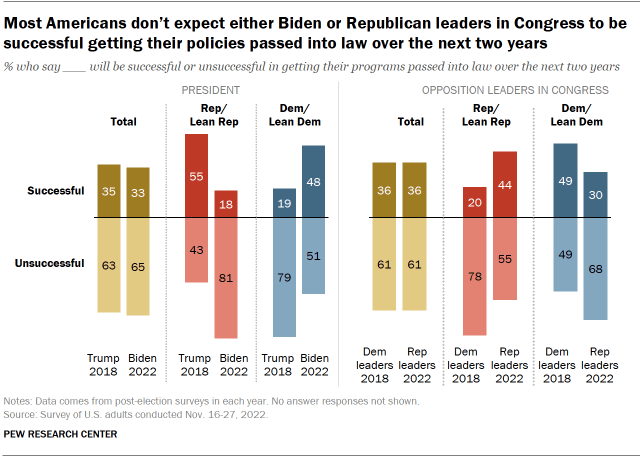
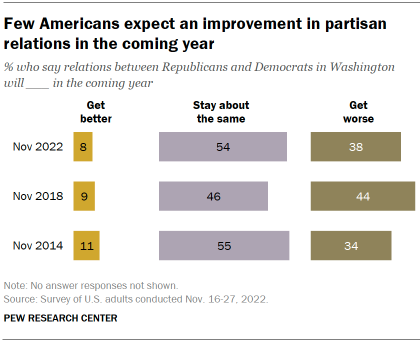
About half of Democrats and Democratic-leaning independents (48%) expect Biden to be successful in enacting his agenda, while a slightly smaller share of Republicans and Republican leaners (44%) say the same about their party’s prospects for success.
Americans largely expect the partisan acrimony that has characterized U.S. politics in recent years to continue: Just 8% say they expect relations between Republicans and Democrats in Washington to improve in the next year. About half of U.S. adults (54%) say relations will stay about the same as they are now, while 38% say relations will get worse in the next year. These views are little different from surveys conducted following the 2018 and 2014 midterm elections.
Other important findings from the post-election survey
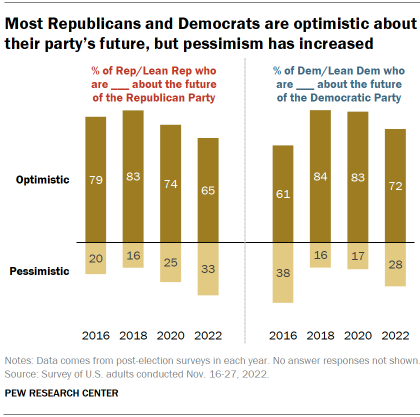
Partisans are less optimistic about their parties’ futures than they were following the last two elections. Today, about two-thirds of Republicans and Republican-leaning independents (65%) and 72% of Democrats and Democratic-leaning independents are optimistic about the future of their own party. But the shares saying this are lower than after the 2020 and 2018 elections. A third of Republicans say they are pessimistic about the GOP’s future, the highest share saying this in recent post-election surveys. About a quarter of Democrats (28%) are pessimistic about their party’s future, higher than in both 2018 and 2020 – though lower than the share saying this following the 2016 election.
More Republicans say elections around the country were well run than in 2020 – but wide partisan gaps in voting confidence remain. About half of voters who cast their ballot for a Republican candidate for the U.S. House (53%) say that elections around the United States were conducted very (14%) or somewhat well (39%) this year; after the 2020 presidential election, just 21% of those who voted for Trump said the same. Democratic voters overwhelmingly say this year’s elections were administered well (96% say either very or somewhat well), similar to the share of Biden’s voters saying this two years ago (94% said very or somewhat well). Republican voters also express higher levels of confidence in the accuracy of counts of mail-in or absentee ballots this year (41% very or somewhat confident that these votes were counted as voters intended) than Trump’s voters in 2020 (19% very or somewhat confident). Still, most GOP voters are skeptical these votes were counted accurately (58% are not too or not at all confident). Democratic voters are overwhelmingly confident absentee ballots were counted as voters intended (94%).
In-person voting increased this year compared with 2020. About four-in-ten voters (44%) say they cast their ballots in person on Election Day in this year’s election, an increase of 17 percentage points compared with 2020 (27%). Absentee and mail-in voting declined from 46% of voters in 2020 to 35% this year. Republicans (52%) are more likely to say they voted in person on Election Day than Democrats (35%), but the share of Democrats voting on Election Day doubled compared with 2020 (17% two years ago).
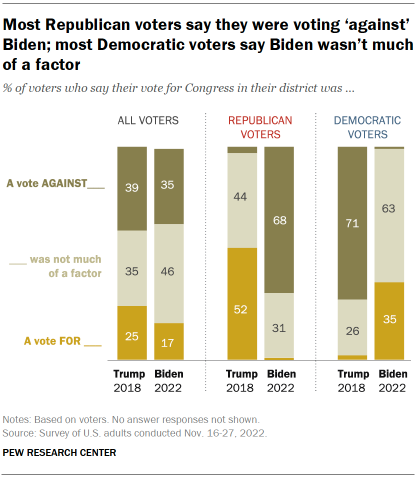
Fewer voters say Biden was a factor in their vote than said so about Trump four years ago. Slightly more than half of voters (53%) say Biden was a factor in their congressional vote this year, while 46% say he was not much of a consideration in their choice. Four years ago, 64% of voters said Trump was a factor. About twice as many voters say they voted against Biden (35%) as say they voted for him (17%). Most Republican voters say their vote was against Biden (68%), while 31% say he wasn’t much of a factor. Biden was much less of a consideration among Democratic voters – about six-in-ten (63%) say he wasn’t a factor for them. Democratic voters are much less likely to say they were voting to support the president this year than Republican voters were four years ago (52% of Republican voters in 2018 said their vote was for Trump, while 35% of Democratic voters say the same about Biden now).
Americans remain dissatisfied with the state of the nation. Just 24% of adults say they are satisfied with the way things are going in the country, while roughly three times as many (75%) are dissatisfied. That is little changed since shortly before the election, when 21% said they were satisfied in October. In fact, the share saying they are satisfied with national conditions has changed only modestly over the past year. Democrats (38%) continue to be more likely than Republicans (11%) to express satisfaction.
Evaluations of election administration
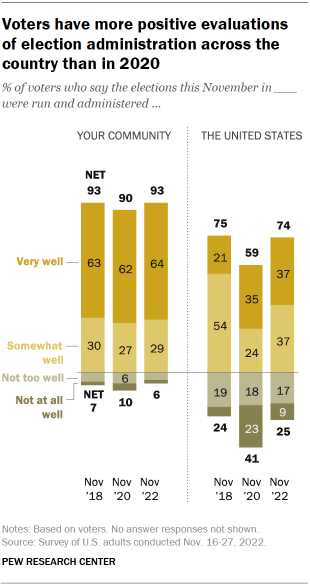
About nine-in-ten voters (93%) say elections in their local communities were administered well this year, while a smaller majority (74%) say elections were administered well across the country.
The share of voters saying their local election was run well has been consistent across the last three election cycles, with about nine-in-ten voters saying their community ran the election well in each cycle. And most voters who give their community positive marks in this area say their local election was run very well: About six-in-ten voters have said this after each election cycle.
Voters are less likely to say elections across the U.S. were well administered than to say this about elections in their community, and far fewer say elections across the country were run very well. About three-quarters of voters (74%) say elections this November in the U.S. were administered very or somewhat well, including 37% who say they were run very well. This is roughly similar to the share who said this after the 2018 election (75%) but higher than after the 2020 election (59%).
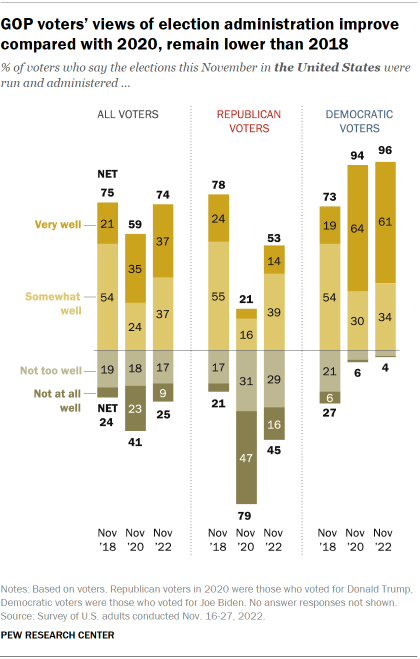
There is a wide partisan gap between Republican voters’ and Democratic voters’ assessments of how well the election was administered around the country this year. About half of Republican voters (53%) and nearly all (96%) Democratic voters say November’s election was very or somewhat well administered. A majority of Democratic voters (61%) say the election was run very well on a national level; just 14% of Republican voters say the same.
The gap in the shares of Republican and Democratic voters who say the election was well run is narrower now than it was in 2020 – but remains far larger than it was in 2018. In 2020, 94% of Biden voters said the election had been run well, compared with just 21% of Trump voters who said this. Nearly half of Trump voters in 2020 (47%) said the election had been run “not at all well.” By contrast, there was very little difference between Republican and Democratic voters’ evaluations of election administration following the 2018 midterm election: 78% of Republican voters and 73% of Democratic voters said the election had been run well.
Most voters confident in accuracy of vote counts
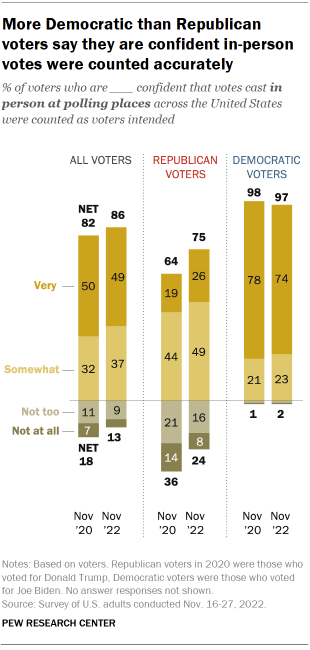
Voters are generally confident ballots were counted accurately in this year’s election, yet they express greater confidence in in-person ballots being counted accurately than they do in counts for absentee or mail-in ballots. Republican voters are more skeptical than Democratic voters that votes were counted accurately – particularly for absentee ballots.
Overall, most voters say they are confident that votes cast in person at polling places were counted as voters intended this year: 86% say they are at least somewhat confident that votes cast in person were counted accurately, including about half (49%) who are very confident.
Three-quarters of Republican voters and 97% of Democratic voters say they are at least somewhat confident in-person ballots were counted accurately. Democratic voters are about three times as likely as GOP voters to say they are very confident in these counts (74% vs. 26%).
Republican voters’ confidence in the counting of in-person ballots this year is higher than Trump voters’ confidence in these counts in 2020: Two years ago, 64% of Trump voters were at least somewhat confident that in-person votes were counted accurately.
Nearly all Democratic voters (97%) say they are confident that in-person votes were counted as voters intended, which is little different from the opinions of Biden voters in 2020 (98% were very or somewhat confident).
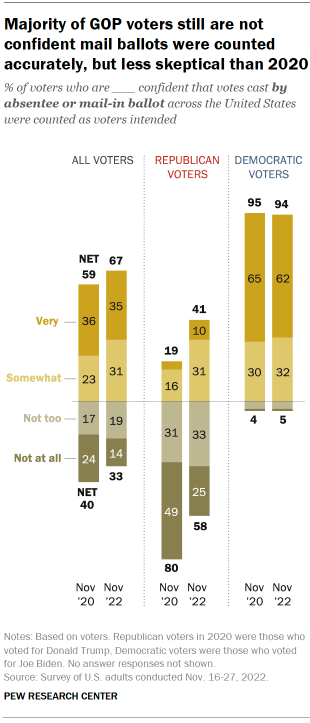
Voters today are somewhat more confident this year than they were two years ago that absentee or mail-in ballots were counted as voters intended, with Republican voters driving this increase in confidence.
Overall, two-thirds of voters say they are very (35%) or somewhat (31%) confident that absentee or mail-in ballots were counted accurately this year, compared with 59% who said this in 2020.
The share of Republican voters who say they are confident that mail-in ballots were counted as voters intended this year (41%) is about twice the share of Trump voters who said this following the 2020 election (19%).
An overwhelming majority of Democratic voters (94%) say they are confident that absentee and mail-in ballots were counted as voters intended, including 62% who say they are very confident of this. These views are nearly identical to those of Biden voters two years ago.
About nine-in-ten voters confident their vote was counted accurately
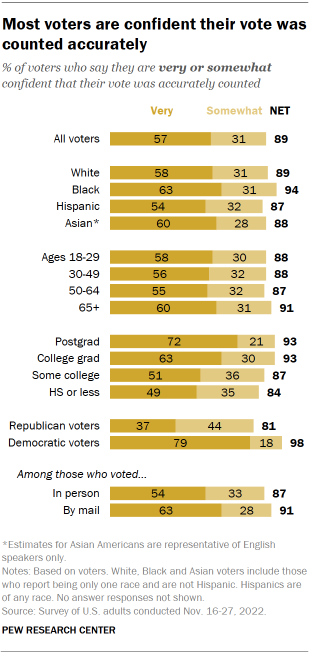
Most voters are confident their own vote was accurately counted in this year’s congressional election, but the strength of that confidence varies greatly between Republican and Democratic voters.
Overall, about nine-in-ten voters (89%) are either very (57%) or somewhat (31%) confident that their vote was accurately counted.
Those who voted for a Democratic candidate in their district are more confident than those who cast their ballot for a Republican candidate that their vote was counted accurately. Nearly all Democratic voters (98%) say they are at least somewhat confident their vote was counted accurately, compared with 81% of Republican voters who say this. Roughly eight-in-ten Democratic voters (79% are very confident their vote was counted correctly, about twice the share of Republican voters who express the same level of confidence (37%).
Black voters (94%) are slightly more likely than White (89%), Asian (88%) and Hispanic (87%) voters to say they are at least somewhat confident that their vote was counted accurately.
Voters with college degrees are more likely than voters with less formal education to say they are highly confident that their vote was counted as intended. About seven-in-ten voters with a postgraduate degree (72%) and 63% of those with a four-year degree say they are very confident of this. Half of voters without a college degree say they are very confident their vote was accurately counted.
While about nine-in-ten of both in-person voters (87%) and mail or absentee voters (91%) express confidence their vote was counted accurately, absentee voters are somewhat more likely to say they are very confident about this (63% vs. 54%).
A greater share of voters cast ballots in person than in 2020
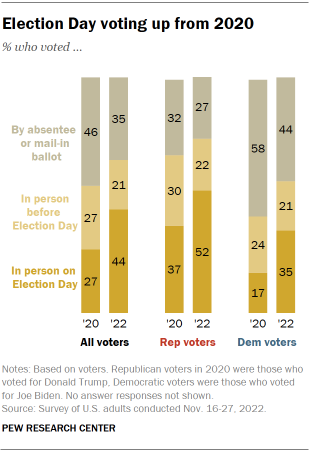
A clear majority of Americans who voted in this year’s congressional elections say they cast their ballots in person. Nearly two-thirds of voters (65%) submitted ballots in person, including 44% who say they voted on Election Day and 21% who voted in person before Election Day.
In the 2020 presidential election, which took place amid heightened concerns over the coronavirus, a narrower majority of voters (54%) submitted ballots in person, including just 27% who cast ballots on Election Day.
As was the case in 2020, there are wide differences in how Republican voters and Democratic voters cast their ballots. About half of Republican voters (52%) cast ballots in person on Election Day this year, while 22% cast ballots in person before Election Day.
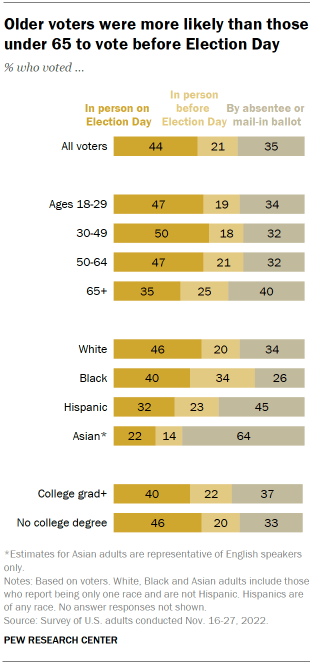
By contrast, about a third of Democratic voters (35%) cast votes in person on Election Day this year – roughly double the share that did the same in the 2020 presidential election. The share of Democrats who voted in person before Election Day is little changed from 2020 (21% vs. 24%), while the share of Democratic voters who cast their votes by absentee or mail-in ballot is 14 percentage points lower than in the 2020 election (44% vs. 58%).
There also are large differences in how voters cast ballots by age and racial or ethnic groups.
Nearly two-thirds of voters ages 65 and older (65%) say they either voted in person before Election Day or voted by mail or absentee. That compares with narrower majorities of voters in younger age groups, who were more likely to vote in person on Election Day.
In addition, White voters are more likely to report voting in person on Election Day (46%) than Black (40%), Hispanic (32%) or Asian voters (21%).


